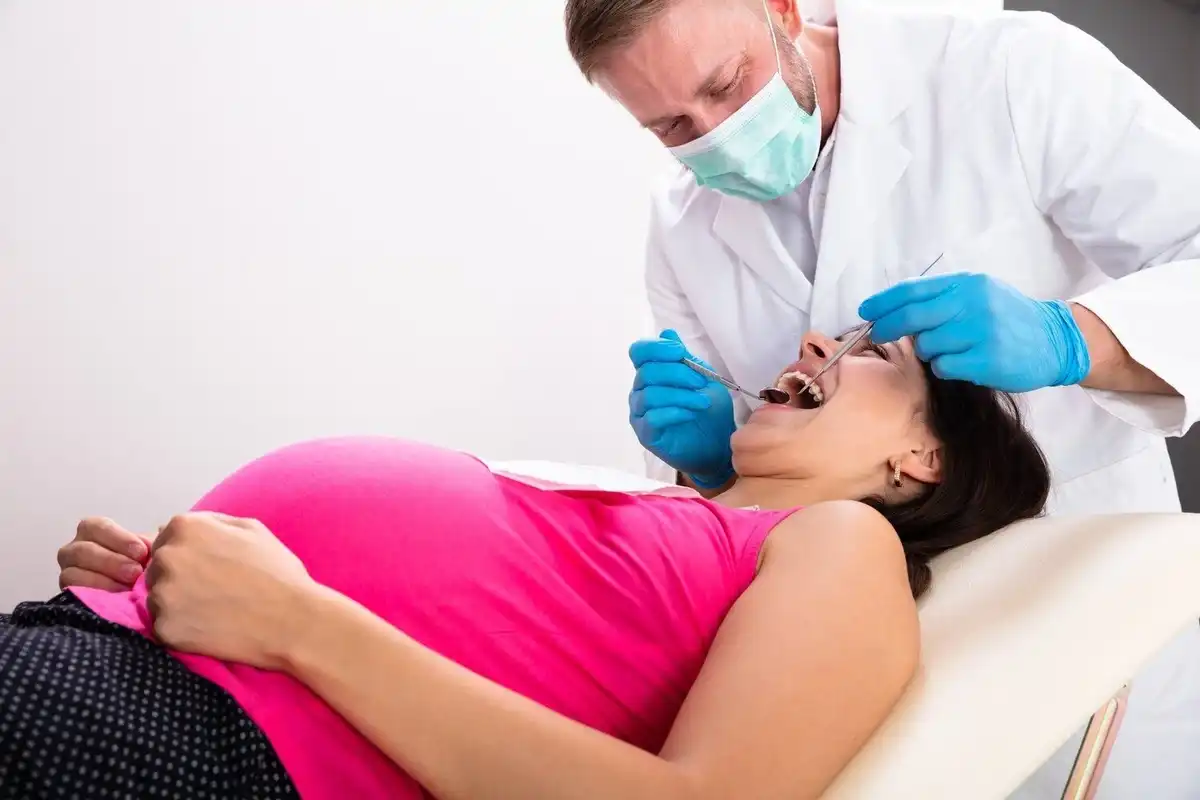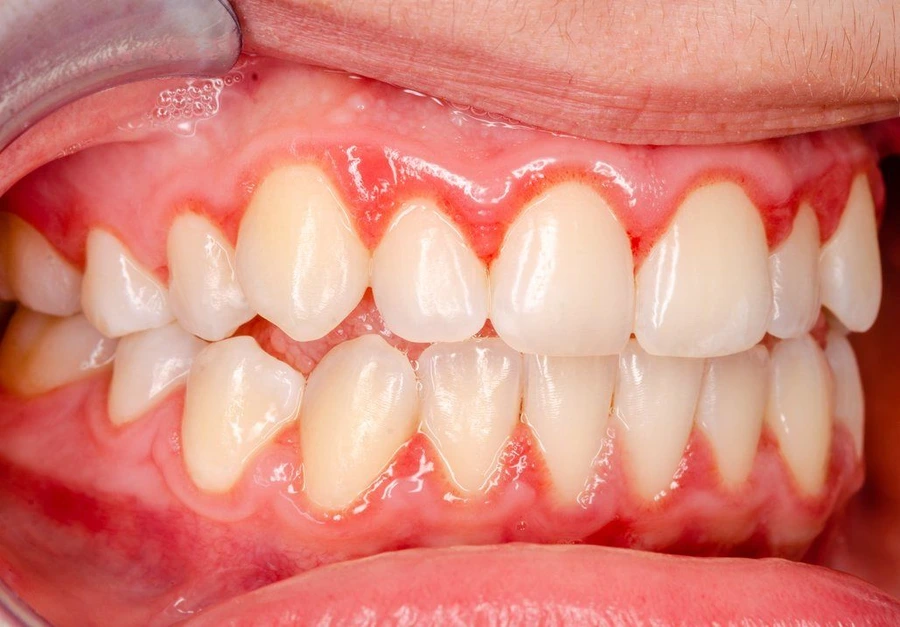Pregnancy Gingivitis: (Tumors, Prevention and Treatment)


About 4 out of 10 pregnant women develop some form of gingivitis sometime during their pregnancy.
Even if you tend to have fairly good oral hygiene, the increased progesterone levels may cause you to get swollen gums or “pregnancy tumors” between the end of your first trimester to the beginning of the third one.
Why does this matter? Because if you’re pregnant and have gum disease (aka periodontitis) it can significantly raise your risk of going into labor prematurely or having a preterm baby that’s underweight.
Active oral infections like gum disease can allow bacteria to spread from your mouth, through your bloodstream, to the placenta, and then through the umbilical cord directly to your baby. Knowing the symptoms of pregnancy gingivitis can help you keep your body (and baby) healthy.
Symptoms Of Gum Disease During Pregnancy
Having symptoms of pregnancy gum disease is similar to what you would look for if you weren’t pregnant. Look for signs of:
- swollen gums
- redness along the gumlines
- gums that bleed when you brush and floss
- sore gums
- bad breath
- gum recession
- raised lumps (pregnancy tumors)
- sore or mobile teeth
- spaces between your teeth
The important thing to remember is that there’s a big difference between gingivitis and gum disease when it comes to pregnancy and teeth. Gingivitis is a reversible condition that you can clear up within a couple of weeks with good oral hygiene.
Periodontal (gum) disease is an infection that affects the structural bone and gums that support your teeth. You may not even realize you have pregnancy gum disease until you notice the gums pulling back and leaving wider spaces between your teeth for food to get caught in.

If you’re brushing and flossing every day before and during pregnancy, but your symptoms start to pop up towards the end of your first trimester, your condition could be hormone-related. Pregnancy and teeth go hand in hand. However, if you aren’t good about brushing AND flossing, the condition may be a classic case of gingivitis or periodontal disease.
Prevention Of Gingivitis During Pregnancy
Having healthy gums means a better chance of a healthy, full-term baby. Going to the dentist for a checkup and cleaning should be a part of your normal prenatal care.
Of course, you probably have more chances of nausea during your first trimester and maybe too uncomfortable to lay back very far during the last trimester. That’s why it’s usually best to schedule your dental checkups before getting pregnant and then sometime during your second trimester.
Getting your teeth professionally cleaned will address any tartar buildup that’s accumulating along your gums, causing them to get irritated. Since you can’t brush or floss tartar off (you can only prevent it by disrupting plaque while it’s still soft) it’s super important to keep seeing your dentist every six months.
Like most women during their pregnancy, you’re probably trying to take extra-good care of your body to stay healthy. When it comes to pregnancy and teeth, your home oral hygiene routine is one of the most important pieces of the puzzle. Make sure you’re brushing at least twice a day and flossing daily (paying extra special attention to your gums!)
If you get morning sickness pretty bad, try not to brush right after you throw up. That can rub the acids around and erode your tooth enamel. Instead, rinse really well with water (you can add a little baking soda to the cup to help neutralize the acid. Rinsing with it is fine, but don’t brush with it since it’s so abrasive.) Wait a while before you brush your teeth.
Gum Disease And Premature Birth
The more research that’s done on gum disease, pregnancy and teeth shows us that women who have periodontal infections are at a significantly higher risk of preeclampsia, going into labor prematurely, and having babies that are under birth weight.
In fact, it can make it harder for you to conceive, to begin with. And it’s not just women that are affected; it’s their partner, too (psssssst…gum disease can also contribute to erectile dysfunction in addition to infertility.)
Here’s the good news. Getting your gum disease treated with professional deep cleanings and good oral hygiene can help you conceive more quickly, have a healthier full-term pregnancy, and statistically give birth to a healthier baby. Not flossing your teeth could actually put your baby at risk, and none of us want that!
Having plaque buildup and tartar can make your gum condition worse. That’s why it’s super-duper important to brush and floss daily to get rid of that bacteria before it tucks itself down under your gums to begin with.
Pregnancy Tumors
Your ears probably perked up when you heard the words “pregnancy tumors” used. This less-common oral condition is seen in about 10% of pregnant women. The good news is that it is NOT cancerous and almost always goes away after you have your baby.
Pregnancy tumors — aka “pyogenic granulomas” — are swollen, red, shiny lumps that grow right along the edges of your gums. They tend to bleed and crust over, especially if you catch them with your toothbrush.
Although pregnancy tumors are mostly hormone-induced, you can lower your risk of getting them by keeping your mouth free of any plaque buildup. If pregnancy is when you finally realize that you have to start flossing, there’s no time like the present!
The two biggest problems with pregnancy tumors are that they’re not very pretty looking and that they can make your mouth uncomfortable. It might even hurt to eat or use your toothbrush.
Treatments For Pregnancy Tumors
Usually, the best treatment for pregnancy tumors is to have good oral hygiene, schedule a cleaning with your dentist, and to just let them run their course.
Although it’s possible to have the really big ones removed with a laser or something, you have about a 50/50 shot of it coming right back. If it’s bad enough, your dentist may recommend going ahead and doing something about it so that you don’t have to wait it out for 9 months.
As long as your dentist says that your teeth are clean and your oral hygiene is good, then you can usually just wait it out and your pregnancy gingivitis should go away when you have the baby!

Make your inbox smile!
Subscribe






